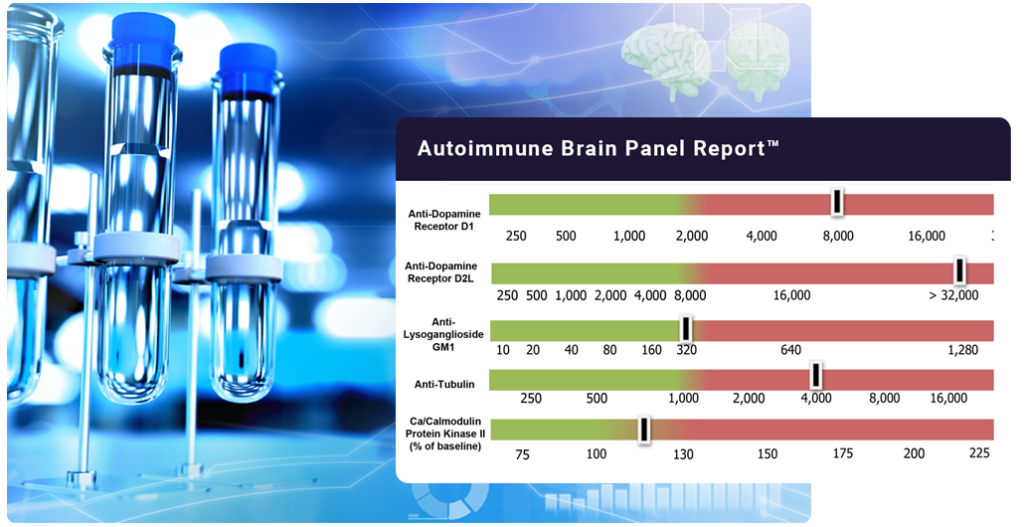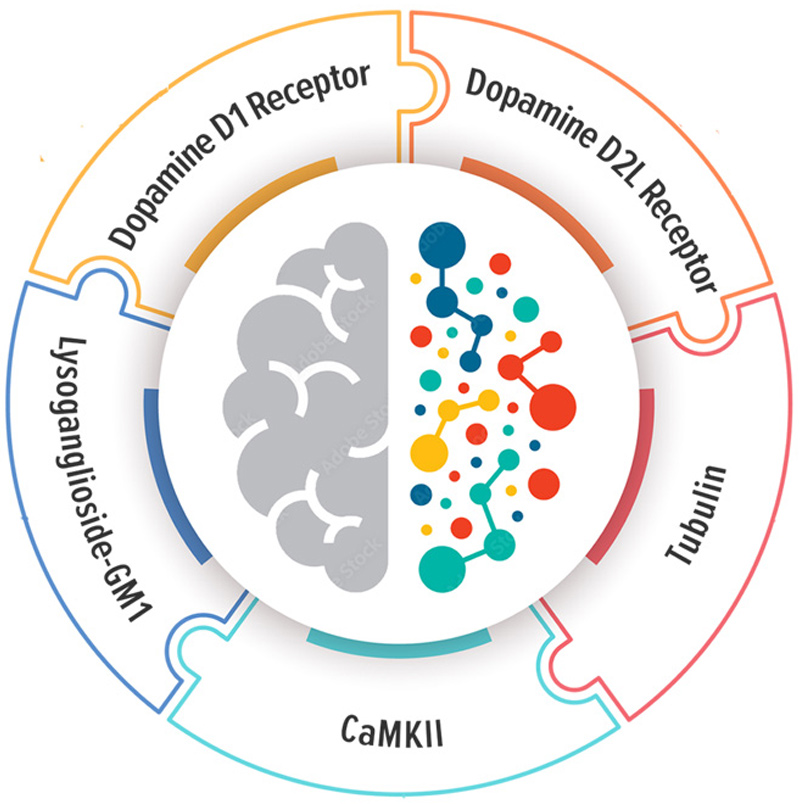Medical resources for healthcare providers
Autoimmune Brain Panel™
Giving you insights to improve patient care.
Our clinically validated Panel includes 5 assays. Four tests measure the levels of circulating autoantibodies in serum that are directed against neuronal targets: Dopamine D1 and D2 receptors, Lysoganglioside and Tubulin. The fifth test, the CaMKII, is a cell stimulation assay. This test measures the ability of the patient’s autoantibodies to stimulate the CaMKII enzyme that is responsible for the upregulation of brain neurotransmitters.
Elevated levels indicate that a patient’s neurologic and/or psychiatric symptoms may be due to a treatable autoimmune dysfunction.

Is This Right For Your Patients?
Insights to help guide treatment.
Our goal is to assist clinicians in identifying an underlying autoimmune etiology in patients presenting with difficult to treat neuropsychiatric symptoms. Studies indicate that for a subset of patients, neurologic and/or psychiatric manifestations may actually be due to a treatable autoimmune dysfunction, rather than a primary neurologic or psychiatric disorder.
These patients typically do not respond to or have had an adverse reaction to standard medications, have a personal or family history of autoimmune disorders, and a preceding infection. Patients may experience a sudden onset of symptoms, including OCD-like behaviors, tics, major depressive disorder or seizures.




Is This Right For Your Patients?
Innovative science that impacts lives.
Our goal is to assist clinicians in identifying an underlying autoimmune etiology in patients presenting with difficult to treat neuropsychiatric symptoms. Studies indicate that for a subset of patients, neurologic and/or psychiatric manifestations may actually be due to a treatable autoimmune dysfunction, rather than a primary neurologic or psychiatric disorder.
These patients typically do not respond to or have had an adverse reaction to standard medications, have a personal or family history of autoimmune disorders, and a preceding infection. Patients may experience a sudden onset of symptoms, including OCD-like behaviors, tics, major depressive disorder or seizures.
The Science behind the Autoimmune Brain Panel™

Anti-Dopamine D1 Receptor
Associated with "psychiatric" symptoms; tends to correlate with mood instability, anxiety, irritability, aggression and, in some cases, psychosis.
Anti-Dopamine D2L Receptor
Associated with "movement" symptoms; tends to correlate with choreiform movements, mycolonus, and exacerbations of hyperactivity.
Anti-Lysoganglioside-GM1
Associated with tics; tends to correlate with complaints of joint or connective tissue pain.
Anti-Tubulin
Assciated with OCD, cognitive interference and "brain fog".
CaMKII – a Cell Stimulation Assay
Associated with sympathetic nervous system activation symptoms; fight or flight behavior, separation anxiety, urinary problems, bedwetting, sensory sensitivites.
Results you can count on.
What your colleagues are saying
Hudson Valley Healing Arts Center
AIM CENTER FOR PERSONALIZED MEDICINE
Educational Resources
We have compiled educational materials, including case reports and published studies on the Autoimmune Brain Panel™ (also known as the Cunningham Panel™), that may be helpful as you treat patients with infection-triggered autoimmune neuropsychiatric disorders.










